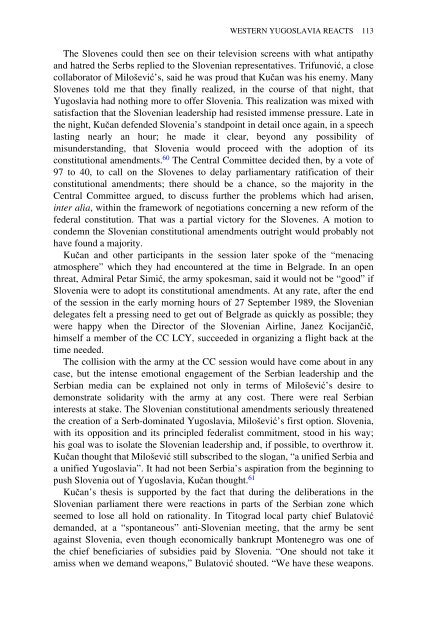Yugoslavia: A History of its Demise - Indymedia
Yugoslavia: A History of its Demise - Indymedia
Yugoslavia: A History of its Demise - Indymedia
You also want an ePaper? Increase the reach of your titles
YUMPU automatically turns print PDFs into web optimized ePapers that Google loves.
WESTERN YUGOSLAVIA REACTS 113<br />
The Slovenes could then see on their television screens with what antipathy<br />
and hatred the Serbs replied to the Slovenian representatives. Trifunović, a close<br />
collaborator <strong>of</strong> Milošević’s, said he was proud that Kučan was his enemy. Many<br />
Slovenes told me that they finally realized, in the course <strong>of</strong> that night, that<br />
<strong>Yugoslavia</strong> had nothing more to <strong>of</strong>fer Slovenia. This realization was mixed with<br />
satisfaction that the Slovenian leadership had resisted immense pressure. Late in<br />
the night, Kučan defended Slovenia’s standpoint in detail once again, in a speech<br />
lasting nearly an hour; he made it clear, beyond any possibility <strong>of</strong><br />
misunderstanding, that Slovenia would proceed with the adoption <strong>of</strong> <strong>its</strong><br />
constitutional amendments. 60 The Central Committee decided then, by a vote <strong>of</strong><br />
97 to 40, to call on the Slovenes to delay parliamentary ratification <strong>of</strong> their<br />
constitutional amendments; there should be a chance, so the majority in the<br />
Central Committee argued, to discuss further the problems which had arisen,<br />
inter alia, within the framework <strong>of</strong> negotiations concerning a new reform <strong>of</strong> the<br />
federal constitution. That was a partial victory for the Slovenes. A motion to<br />
condemn the Slovenian constitutional amendments outright would probably not<br />
have found a majority.<br />
Kučan and other participants in the session later spoke <strong>of</strong> the “menacing<br />
atmosphere” which they had encountered at the time in Belgrade. In an open<br />
threat, Admiral Petar Simić, the army spokesman, said it would not be “good” if<br />
Slovenia were to adopt <strong>its</strong> constitutional amendments. At any rate, after the end<br />
<strong>of</strong> the session in the early morning hours <strong>of</strong> 27 September 1989, the Slovenian<br />
delegates felt a pressing need to get out <strong>of</strong> Belgrade as quickly as possible; they<br />
were happy when the Director <strong>of</strong> the Slovenian Airline, Janez Kocijančič,<br />
himself a member <strong>of</strong> the CC LCY, succeeded in organizing a flight back at the<br />
time needed.<br />
The collision with the army at the CC session would have come about in any<br />
case, but the intense emotional engagement <strong>of</strong> the Serbian leadership and the<br />
Serbian media can be explained not only in terms <strong>of</strong> Milošević’s desire to<br />
demonstrate solidarity with the army at any cost. There were real Serbian<br />
interests at stake. The Slovenian constitutional amendments seriously threatened<br />
the creation <strong>of</strong> a Serb-dominated <strong>Yugoslavia</strong>, Milošević’s first option. Slovenia,<br />
with <strong>its</strong> opposition and <strong>its</strong> principled federalist commitment, stood in his way;<br />
his goal was to isolate the Slovenian leadership and, if possible, to overthrow it.<br />
Kučan thought that Milošević still subscribed to the slogan, “a unified Serbia and<br />
a unified <strong>Yugoslavia</strong>”. It had not been Serbia’s aspiration from the beginning to<br />
push Slovenia out <strong>of</strong> <strong>Yugoslavia</strong>, Kučan thought. 61<br />
Kučan’s thesis is supported by the fact that during the deliberations in the<br />
Slovenian parliament there were reactions in parts <strong>of</strong> the Serbian zone which<br />
seemed to lose all hold on rationality. In Titograd local party chief Bulatović<br />
demanded, at a “spontaneous” anti-Slovenian meeting, that the army be sent<br />
against Slovenia, even though economically bankrupt Montenegro was one <strong>of</strong><br />
the chief beneficiaries <strong>of</strong> subsidies paid by Slovenia. “One should not take it<br />
amiss when we demand weapons,” Bulatović shouted. “We have these weapons.
















